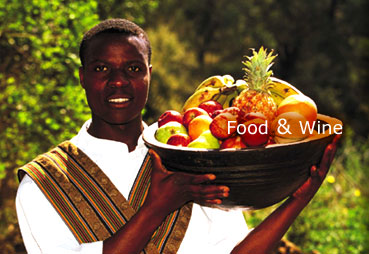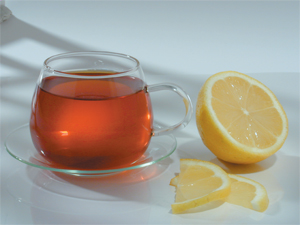
 |
 |
 |
 |
 |
 |
 |
 |
 |

|
There is a small area, called the Cederberg, in the Western Cape province of South Africa where a very special tea, called Rooibos, is grown. Rooibos literally means ‘red bush’ and refers to the colour of the plant once it has been dried and fermented. Its scientific name is Aspalathus linearis. This warm, earthy, fruity-flavoured tea is a natural choice for those who are health conscious. It has been drunk by the indigenous people of South Africa (the Khoi people) long before Europeans began to settle in the country in 1652. Local people harvested the wild plants and produced tea by a process of cutting the twigs and leaves with axes, brusing them with wooden hammers, fermenting the product in heaps and then drying it. These days it is cultivated, but the plant only grows in a 300 kilometre radius around the town of Clanwilliam. Attempts have been made to grow Rooibos in Australia and California, but they failed. South Africa produces just over 10 000 tons of the tea, of which nearly 6 500 tons are exported, mainly to Germany, Japan and the Netherlands. Rooibos tea, sold as loose tea or in teabags, can be brewed with hot water and drunk plain, with honey, milk or sugar, according to taste. Iced Rooibos tea is also becoming an increasingly popular refreshment. Rooibos tea is a health-promoting beverage, rich in various minerals, including copper, iron, potassium, calcium, fluoride, zinc, manganese and magnesium. It contains no colourants, preservatives or caffeine and has a very low tannin content and no oxalic acid, making it a good beverage for people prone to kidney stones. According to studies conducted in South Africa and Japan, Rooibos has been shown to be helpful for such health problems as insomnia, irritability, headaches, nervous tension and hypertension. It is also helpful in relieving stomach cramps and colic in infants and has been used to treat allergies such as hay fever, asthma and eczema. Rooibos contains anti-oxidants, which can help slow the aging process and boost the immune system. It has even been used as an ingredient in cosmetics. Apart from all its health benefits, Rooibos is a great thirst quencher and an excellent, safe beverage for active people, including children, pregnant women and nursing mothers.
|


